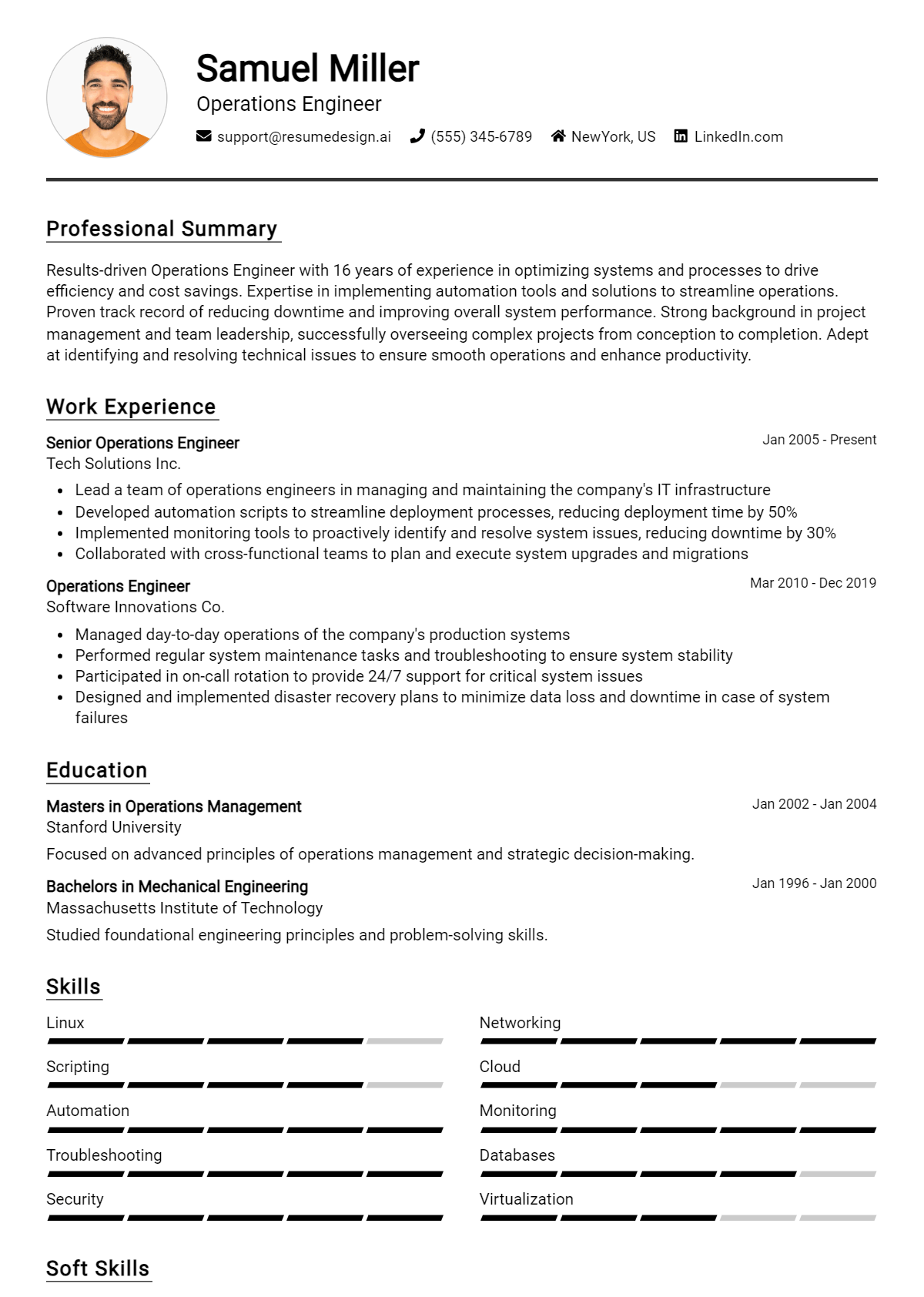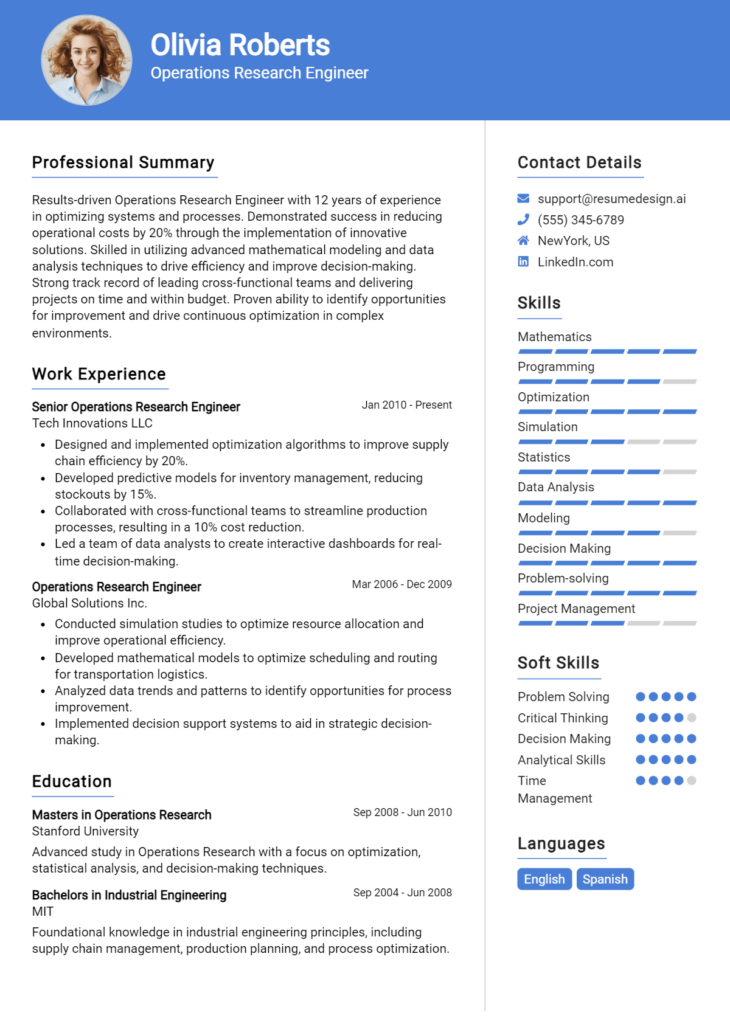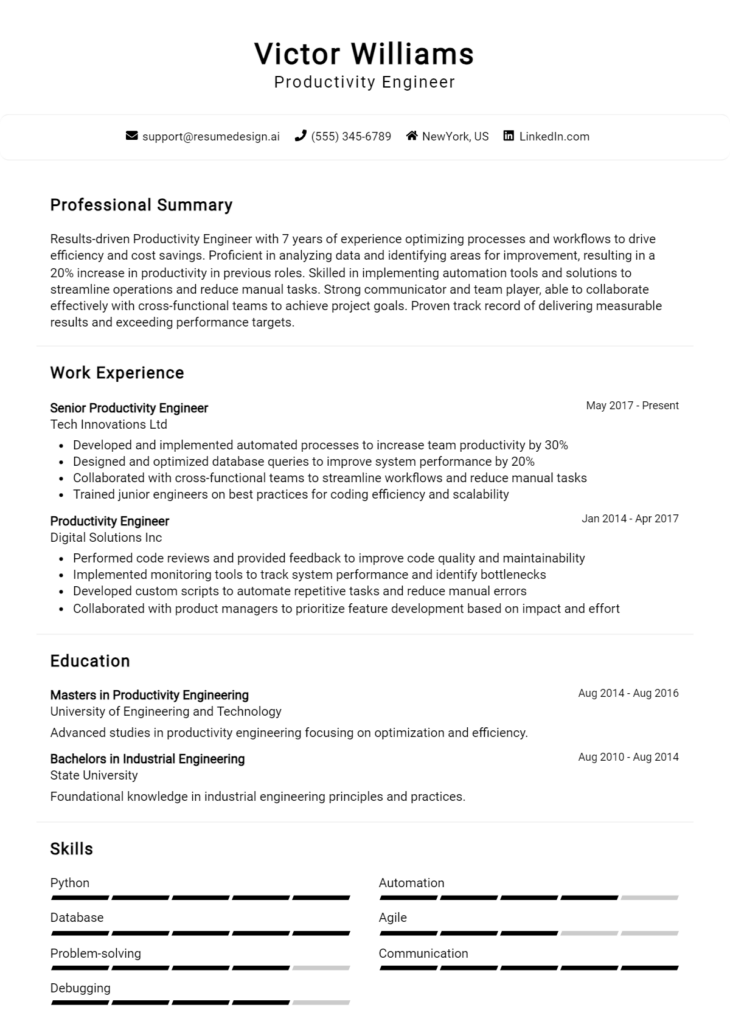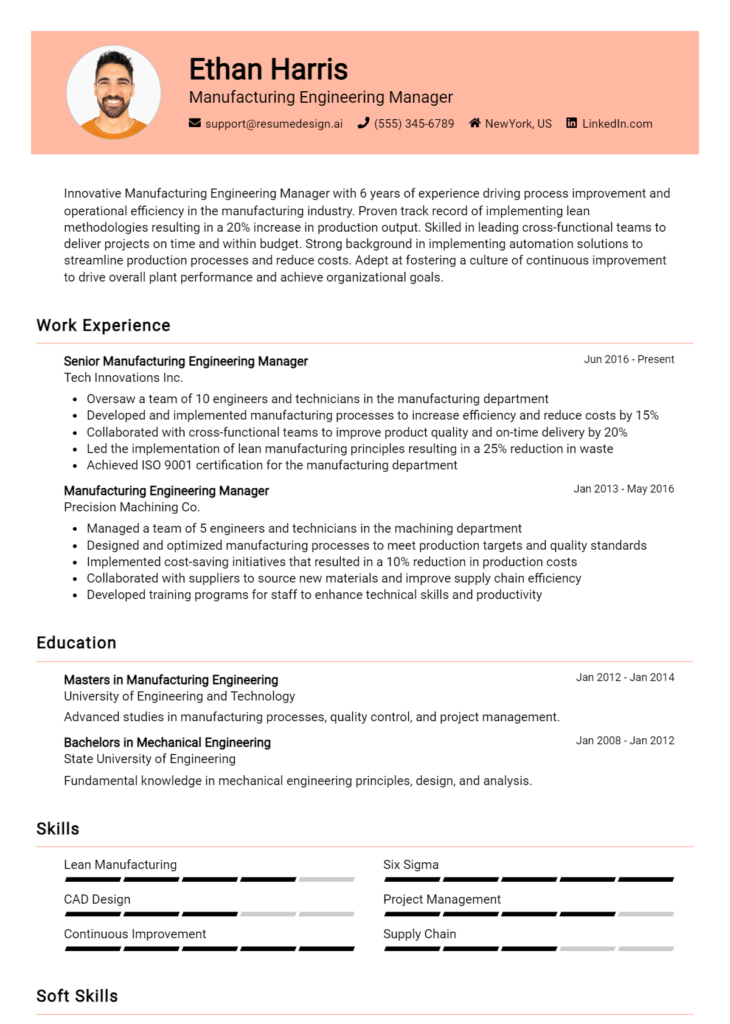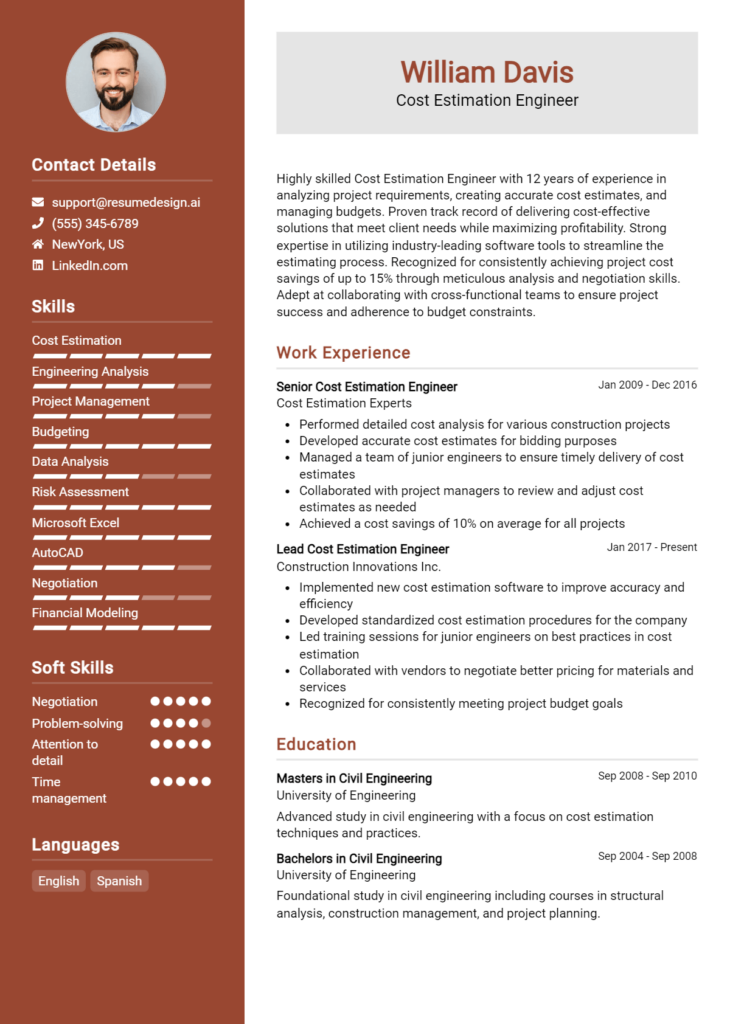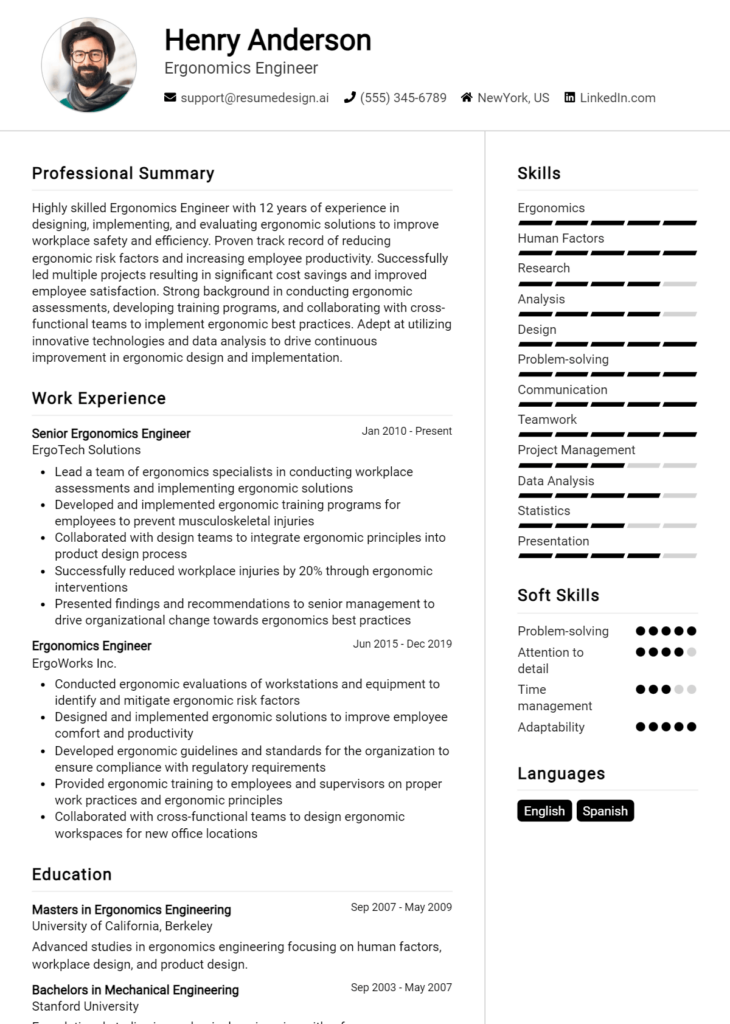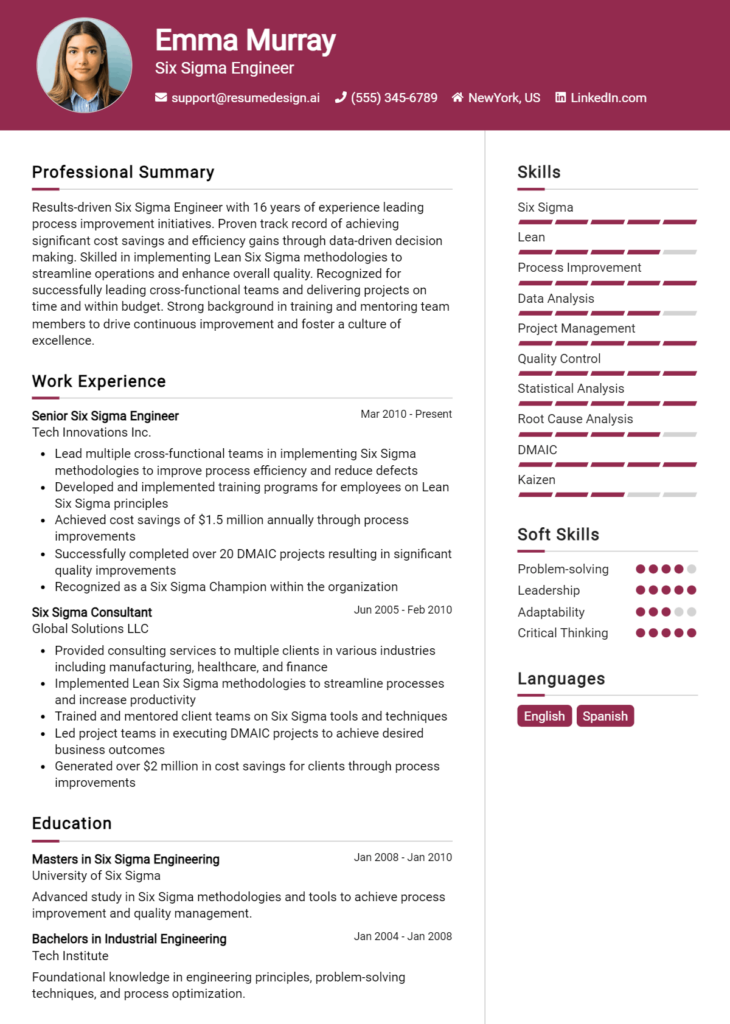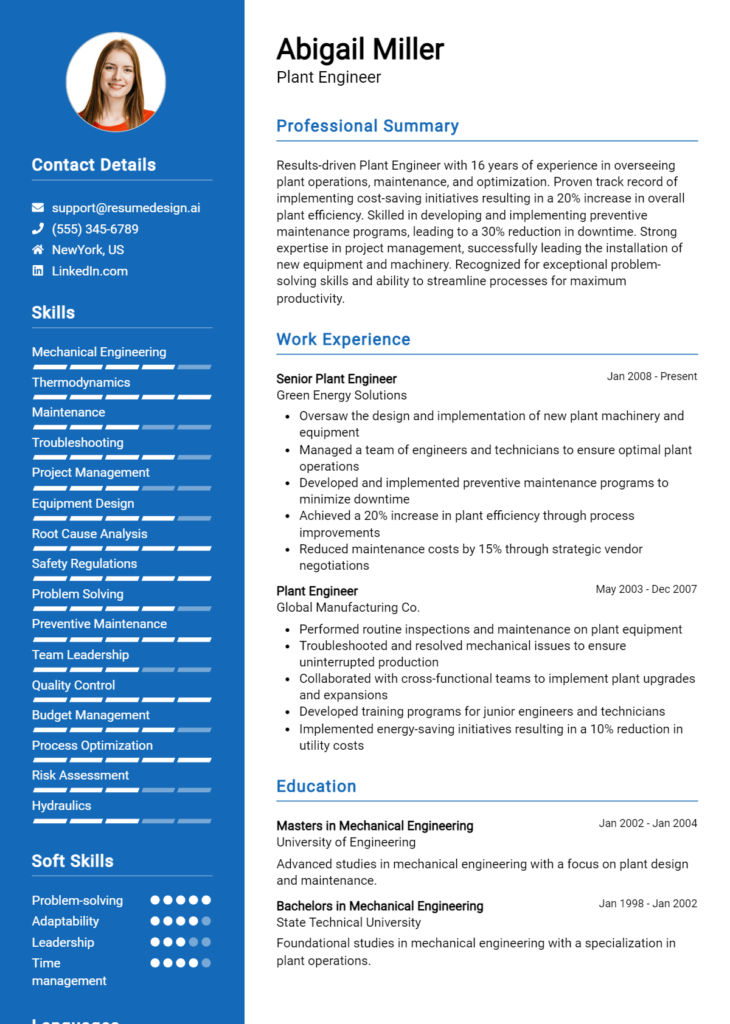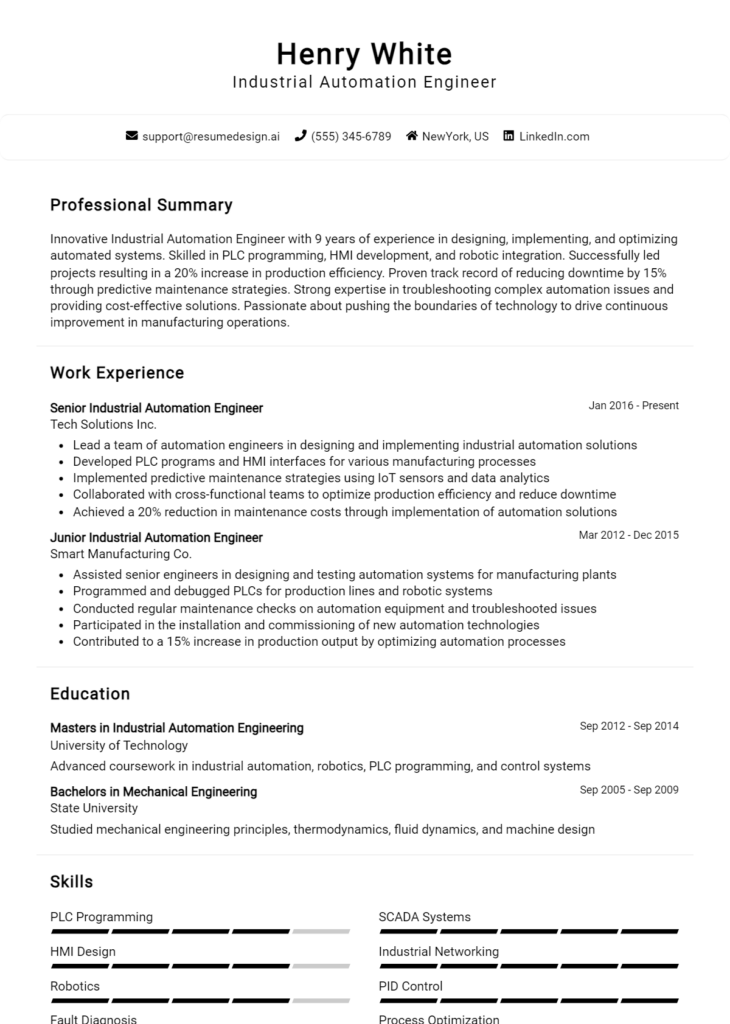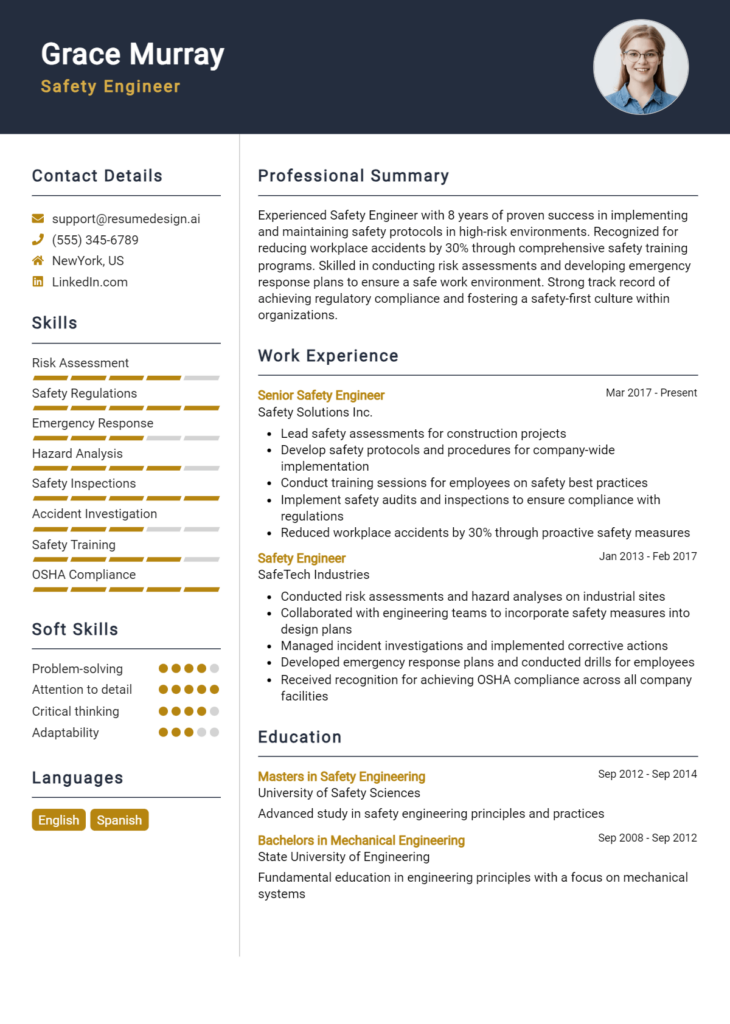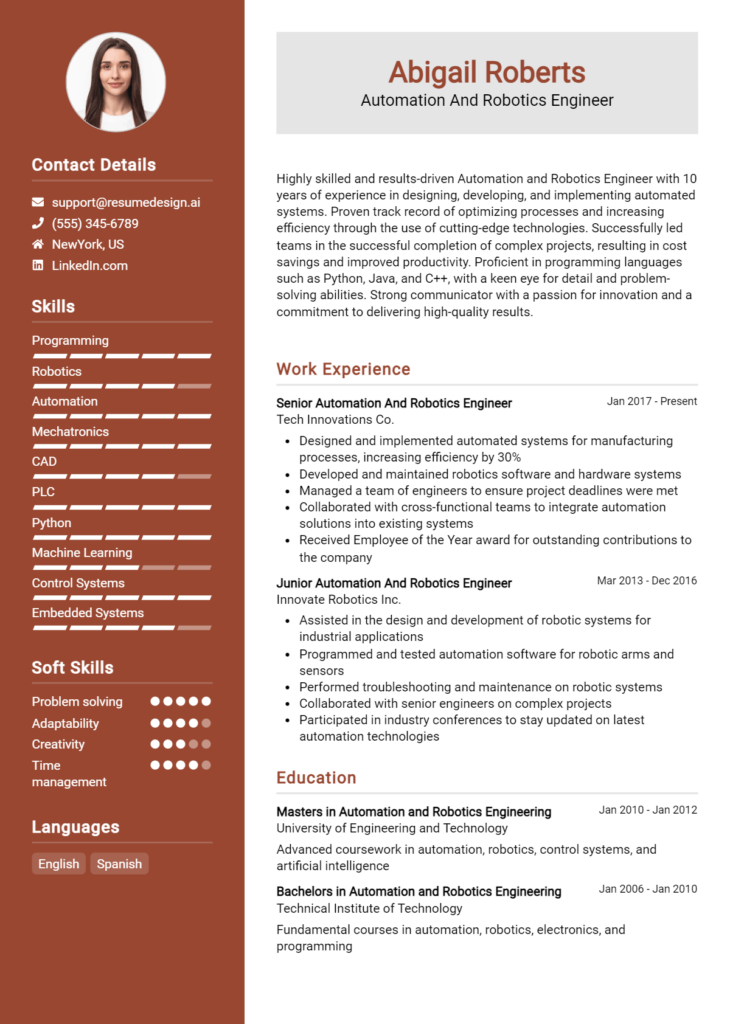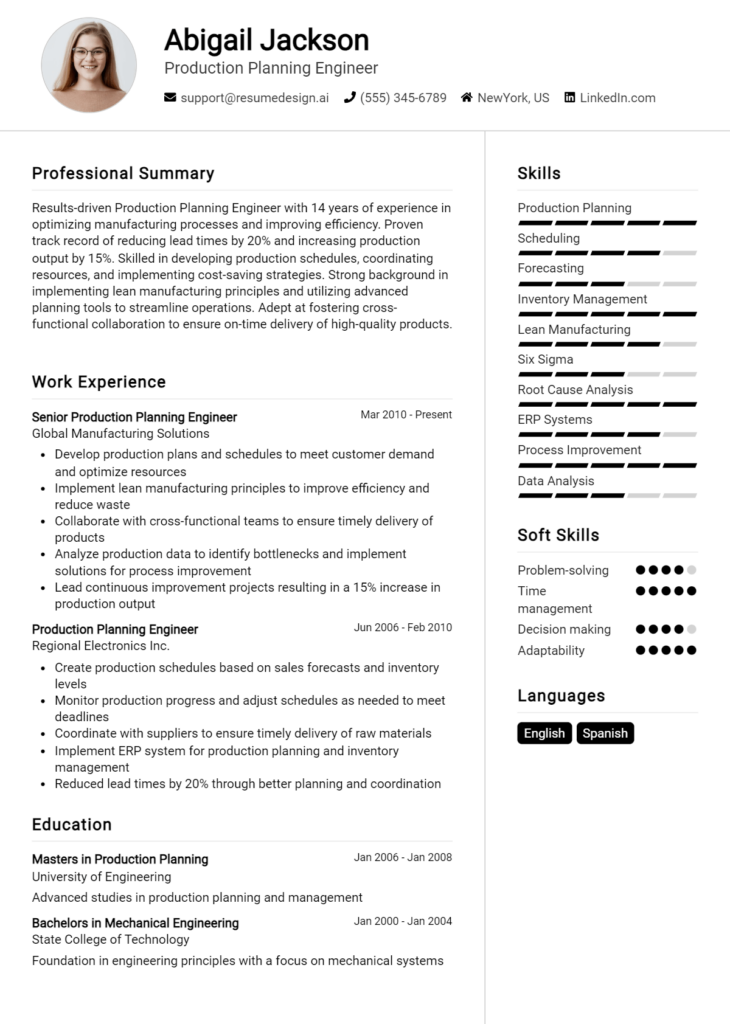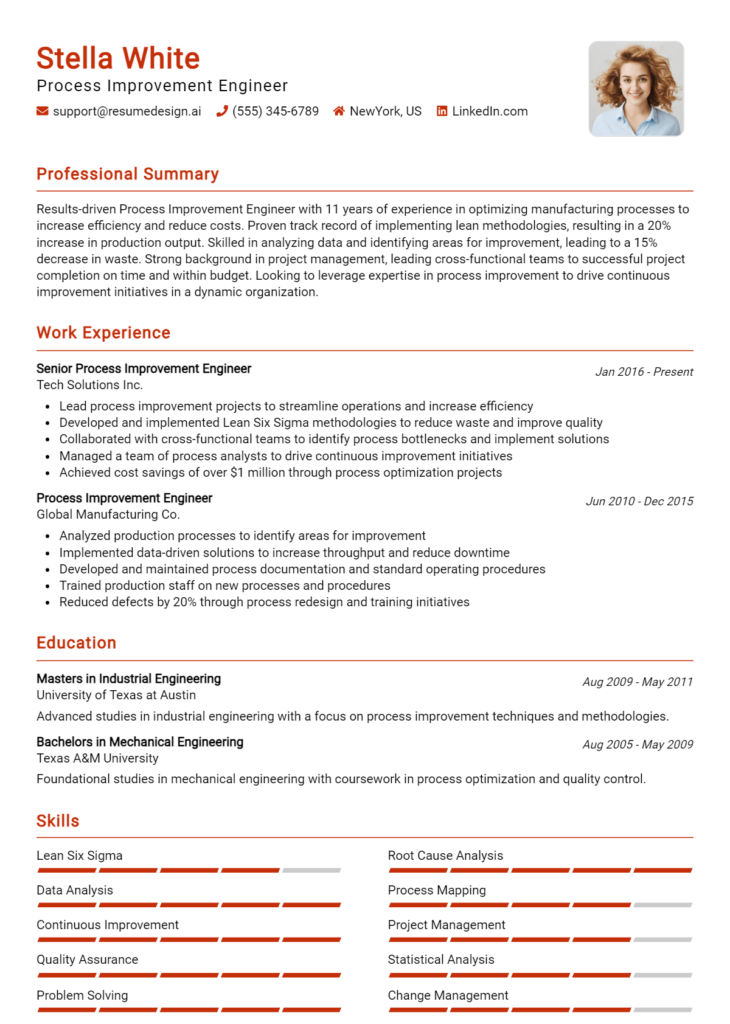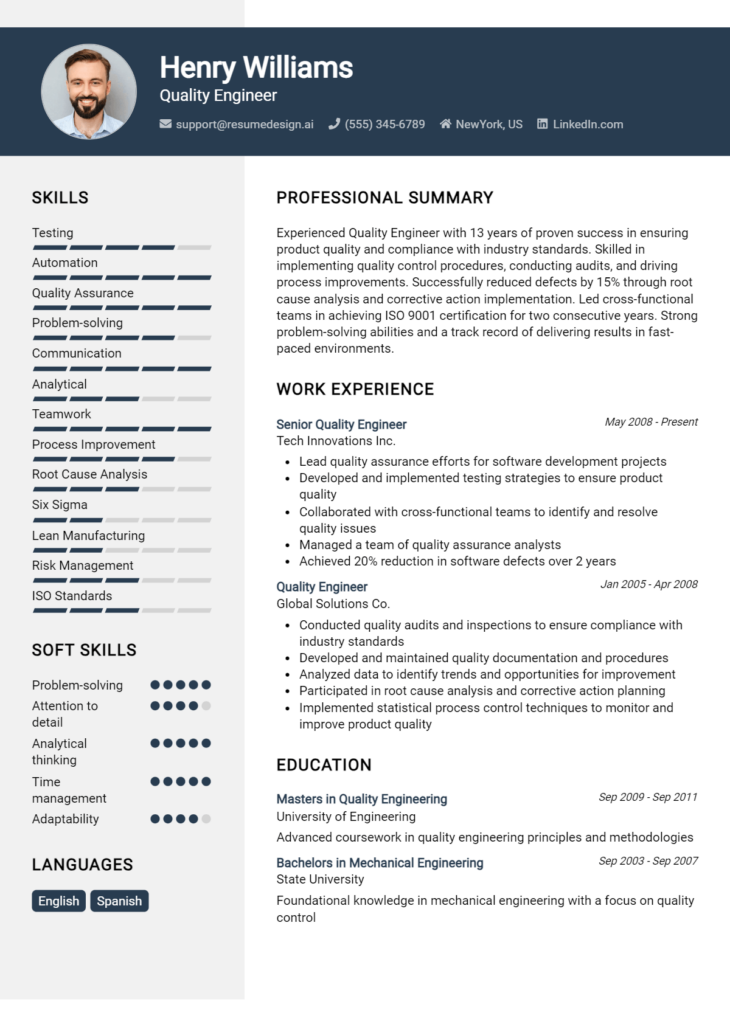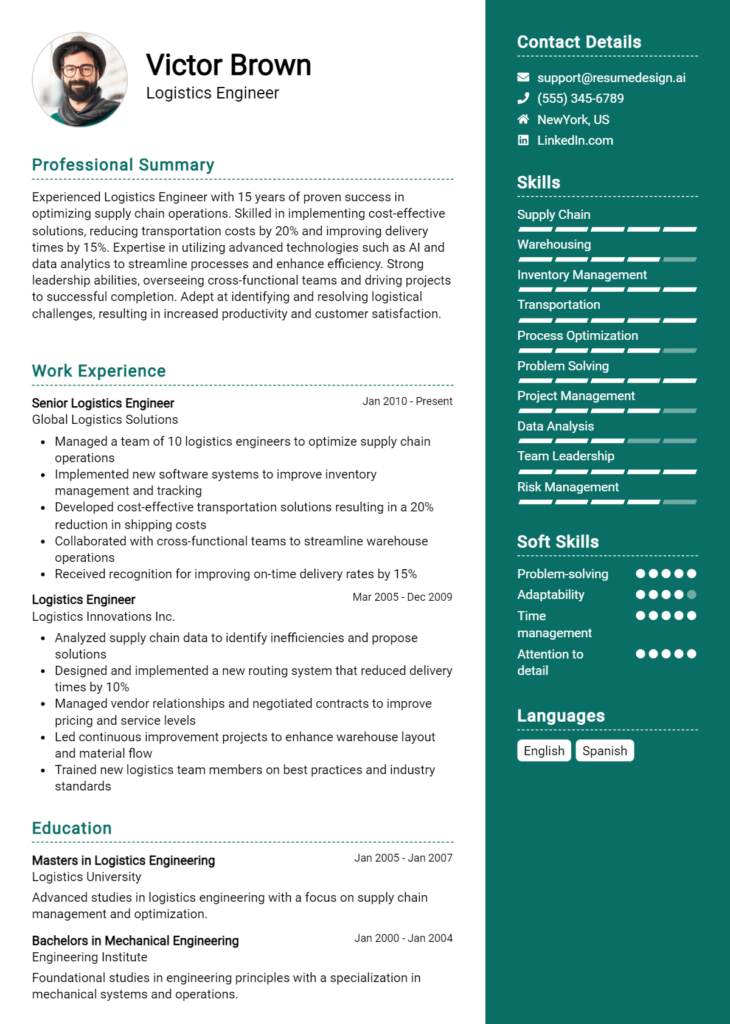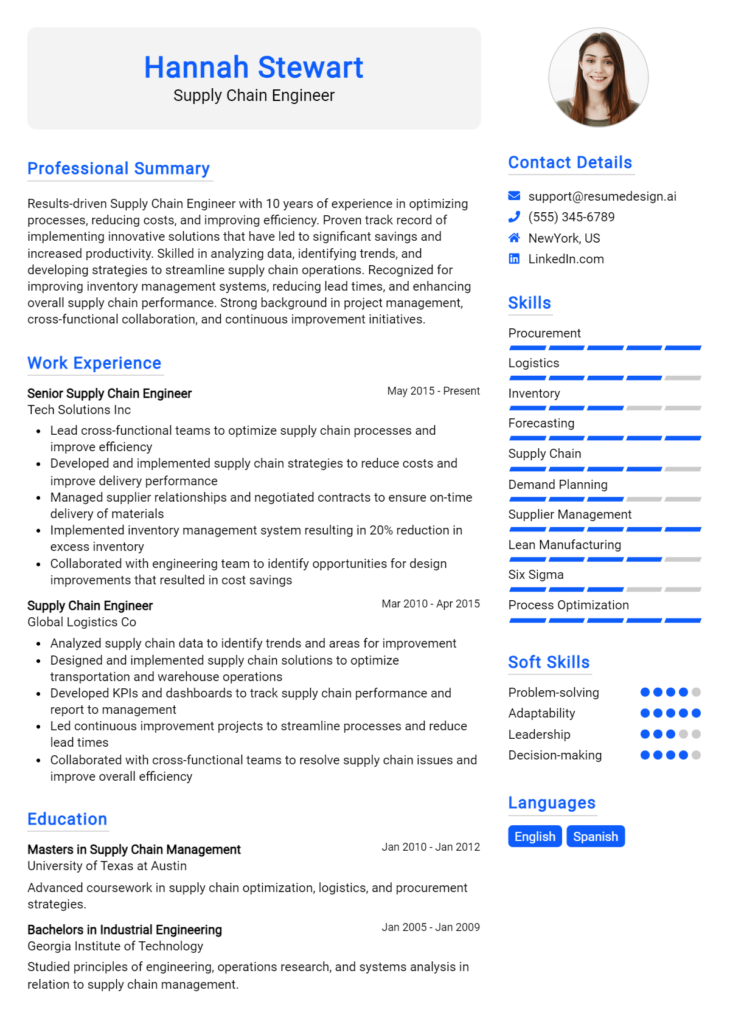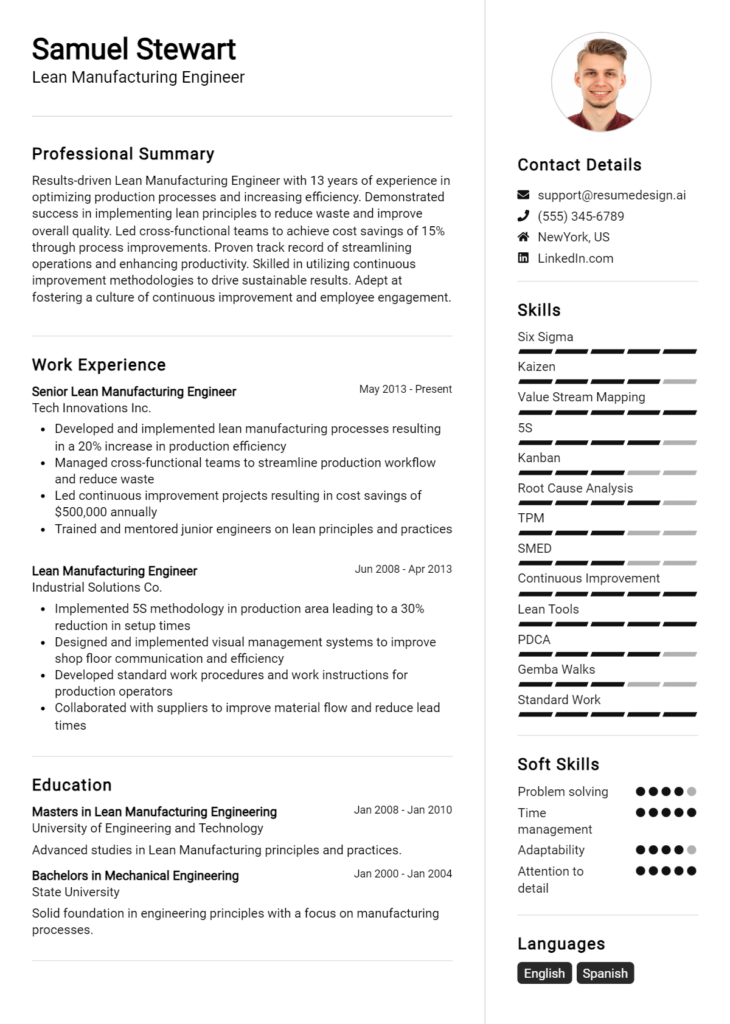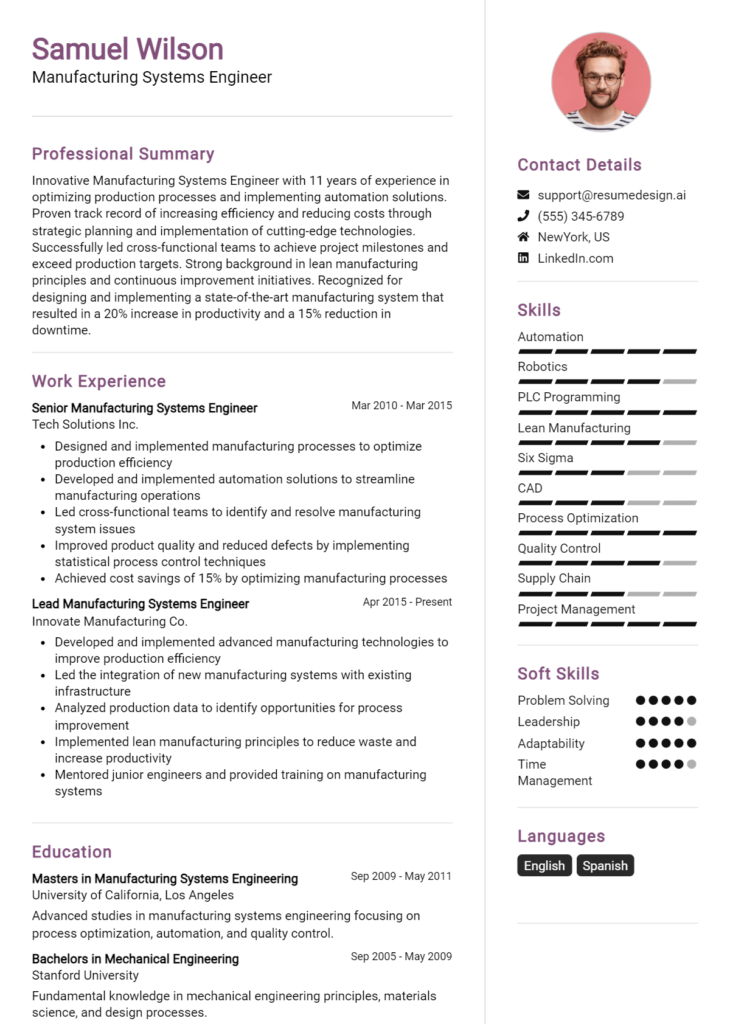Operations Engineer Core Responsibilities
An Operations Engineer plays a crucial role in optimizing and managing the operational processes of an organization. Key responsibilities include analyzing workflow, improving system efficiency, and implementing technical solutions that bridge various departments such as production, engineering, and quality assurance. Essential skills include strong analytical abilities, technical expertise, and adept problem-solving. These skills contribute to achieving organizational goals by enhancing productivity and reducing costs. A well-structured resume can effectively highlight these qualifications, showcasing the candidate's readiness to drive operational excellence.
Common Responsibilities Listed on Operations Engineer Resume
- Designing and implementing operational processes to improve efficiency.
- Conducting data analysis to identify areas for improvement.
- Collaborating with cross-functional teams to ensure seamless operations.
- Developing and monitoring key performance indicators (KPIs).
- Managing project timelines and resource allocation.
- Conducting root cause analysis for operational issues.
- Implementing best practices in process optimization.
- Training team members on operational procedures and safety standards.
- Overseeing compliance with industry regulations and standards.
- Utilizing software tools for process mapping and simulation.
- Preparing detailed reports on operational performance.
- Participating in continuous improvement initiatives.
High-Level Resume Tips for Operations Engineer Professionals
In the competitive landscape of Operations Engineering, a well-crafted resume serves as your first and often most critical opportunity to make a lasting impression on potential employers. Your resume is not just a document; it is a personal marketing tool that should effectively showcase your skills, experience, and achievements in a way that aligns with the needs of the hiring organization. Given the technical nature of the role, it’s essential that your resume reflects both your operational expertise and your ability to implement solutions that drive efficiency and effectiveness. This guide will provide you with practical and actionable resume tips specifically tailored for Operations Engineer professionals, helping you stand out in a crowded job market.
Top Resume Tips for Operations Engineer Professionals
- Tailor your resume for each job application by closely aligning your skills and experience with the specific job description.
- Highlight relevant experience in operations management, process optimization, and project management.
- Quantify your achievements with concrete numbers, such as percentage improvements in efficiency or cost reductions.
- Showcase industry-specific skills, such as familiarity with Lean, Six Sigma, or other operational methodologies.
- Include technical skills relevant to the position, such as proficiency in specific software or tools used in operations engineering.
- Utilize action verbs and clear language to describe your responsibilities and accomplishments.
- Incorporate keywords from the job listing to improve your resume's visibility in applicant tracking systems.
- Maintain a clean and professional format that enhances readability and keeps the focus on your qualifications.
- Consider adding a summary statement at the top of your resume to encapsulate your key strengths and career goals.
- Keep your resume concise, ideally one page, to ensure that hiring managers can quickly grasp your qualifications.
By implementing these tips, you can significantly enhance your resume and increase your chances of landing a job in the Operations Engineer field. A well-structured and targeted resume not only demonstrates your qualifications but also communicates your commitment to contributing to operational excellence, making you a more attractive candidate to potential employers.
Why Resume Headlines & Titles are Important for Operations Engineer
In the competitive field of Operations Engineering, a well-crafted resume headline or title serves as a crucial first impression for potential employers. A strong headline can immediately capture the attention of hiring managers by summarizing a candidate's key qualifications in a concise and impactful phrase. It acts as a powerful introduction that highlights relevant skills, experiences, and achievements, making it easier for hiring managers to quickly assess a candidate's fit for the role. Therefore, crafting a resume headline that is both relevant and directly related to the job being applied for is essential to standing out in a crowded job market.
Best Practices for Crafting Resume Headlines for Operations Engineer
- Keep it concise: Aim for one impactful phrase that summarizes your qualifications.
- Be role-specific: Use terminology and keywords relevant to the Operations Engineer position.
- Highlight key strengths: Focus on your most impressive skills or achievements.
- Use action-oriented language: Begin with action verbs to convey a proactive stance.
- Avoid jargon: Ensure clarity by avoiding overly complex terminology that may confuse the reader.
- Tailor to the job description: Customize your headline based on the specific job requirements.
- Include quantifiable achievements: Whenever possible, incorporate numbers to demonstrate impact.
- Stay professional: Maintain a formal tone that reflects the seriousness of the role.
Example Resume Headlines for Operations Engineer
Strong Resume Headlines
Results-Driven Operations Engineer with 8+ Years of Experience in Process Optimization
Innovative Operations Engineer Specializing in Lean Manufacturing and Cost Reduction Strategies
Dynamic Operations Engineer with Proven Success in Leading Cross-Functional Teams to Achieve Operational Excellence
Weak Resume Headlines
Operations Engineer Looking for a Job
Experienced Engineer
The strong resume headlines are effective because they convey specific qualifications, highlight relevant experience, and demonstrate a clear understanding of the Operations Engineer role. They use compelling language that draws attention and showcases the candidate's unique strengths. In contrast, the weak headlines fail to impress due to their vagueness and lack of detail, making it difficult for hiring managers to gauge the applicant's fit for the position. A generic title does not differentiate the candidate from others and can lead to missed opportunities in a competitive job market.
Writing an Exceptional Operations Engineer Resume Summary
A resume summary is a critical component for an Operations Engineer, serving as the first impression a hiring manager will have of a candidate's qualifications. This brief yet impactful paragraph provides a snapshot of key skills, relevant experience, and significant accomplishments that align with the job role. A strong summary captures the attention of hiring managers quickly, setting the tone for the rest of the resume by demonstrating the candidate’s ability to contribute effectively to the organization. It should be concise, focused, and tailored specifically to the job being applied for, ensuring that the most relevant information is presented upfront.
Best Practices for Writing a Operations Engineer Resume Summary
- Quantify achievements to provide concrete evidence of your impact.
- Focus on key skills that are relevant to the Operations Engineer role.
- Tailor the summary to the specific job description to highlight your fit.
- Use action verbs to convey a sense of initiative and achievement.
- Keep it concise, ideally between 3-5 sentences.
- Highlight industry-specific knowledge or certifications.
- Avoid jargon and ensure clarity to appeal to a broad audience.
- Showcase problem-solving abilities and how they’ve led to improved operations.
Example Operations Engineer Resume Summaries
Strong Resume Summaries
Results-driven Operations Engineer with over 7 years of experience in optimizing manufacturing processes, leading to a 20% increase in productivity and a 15% reduction in operational costs. Proven expertise in implementing Lean methodologies and Six Sigma practices.
Dedicated Operations Engineer with a strong background in project management and process improvement. Successfully led a cross-functional team to reduce equipment downtime by 30%, enhancing overall operational efficiency and saving the company $100,000 annually.
Experienced Operations Engineer specializing in system optimization and workflow enhancements. Achieved a 25% improvement in process efficiency through strategic analysis and the implementation of automated solutions, resulting in a significant increase in output quality.
Accomplished Operations Engineer with a proven track record of managing complex operations in the automotive industry. Spearheaded a project that increased production speed by 40% while maintaining compliance with all safety regulations.
Weak Resume Summaries
Operations Engineer with experience in various roles. Good at problem-solving and working with teams.
Detail-oriented engineer skilled in operations. Looking to leverage my skills in a new position.
The strong resume summaries are effective because they provide specific, quantifiable achievements and articulate relevant skills that align directly with the Operations Engineer role. They demonstrate the candidate's impact on previous organizations, showcasing their ability to deliver results. In contrast, the weak summaries are vague and lack measurable outcomes, making it difficult for hiring managers to assess the candidate's qualifications or relevance to the position. They do not provide enough detail to differentiate the candidate in a competitive job market.
Work Experience Section for Operations Engineer Resume
The work experience section of an Operations Engineer resume plays a crucial role in demonstrating the candidate's technical proficiency, leadership capabilities, and commitment to delivering high-quality products. This section not only highlights specific skills and experiences relevant to the operations engineering field but also showcases the candidate's ability to manage teams effectively and drive projects to successful completion. By quantifying achievements and aligning previous roles with industry standards, candidates can create a compelling narrative that sets them apart in a competitive job market.
Best Practices for Operations Engineer Work Experience
- Use quantifiable metrics to showcase achievements, such as cost reductions, efficiency improvements, or project completion rates.
- Highlight technical skills relevant to the job description, including specific software, tools, and methodologies used.
- Demonstrate leadership by detailing experiences in team management, project oversight, and mentorship roles.
- Include collaborative projects that emphasize your ability to work with cross-functional teams.
- Tailor your work experience to align with industry standards and expectations for Operations Engineers.
- Utilize action verbs to convey a sense of initiative and impact in your previous roles.
- Focus on problem-solving experiences that illustrate your ability to tackle operational challenges.
- Maintain a clear and concise format, making it easy for hiring managers to quickly assess your qualifications.
Example Work Experiences for Operations Engineer
Strong Experiences
- Led a cross-functional team to implement a new production line that increased output by 30% while reducing costs by 15% within the first year.
- Developed and executed a maintenance plan that decreased equipment downtime by 25%, resulting in a significant boost to overall productivity.
- Managed a team of 10 engineers to successfully complete a major project three months ahead of schedule, saving the company $100,000 in labor costs.
- Collaborated with IT to streamline data collection processes, improving reporting accuracy by 40% and enhancing decision-making capabilities.
Weak Experiences
- Worked on various projects related to operations without specifying outcomes or contributions.
- Responsible for maintenance tasks but without mentioning any specific achievements or improvements.
- Assisted team members with daily operations, providing vague descriptions of duties.
- Participated in meetings to discuss project statuses but did not take on any leadership roles or responsibilities.
The examples provided illustrate the difference between strong and weak experiences in an Operations Engineer resume. Strong experiences are characterized by specific, quantifiable outcomes and clear evidence of leadership and collaboration, effectively showcasing the candidate's skills and contributions. In contrast, weak experiences lack detail and fail to highlight any substantial achievements, making it difficult for hiring managers to assess the candidate's true capabilities and impact in previous roles.
Education and Certifications Section for Operations Engineer Resume
The education and certifications section of an Operations Engineer resume is a crucial component that showcases a candidate's academic background and their commitment to continuous professional development. This section not only lists relevant degrees and certifications but also highlights the specific coursework and specialized training that align with the demands of the role. By providing this information, candidates can significantly enhance their credibility, demonstrating their preparedness for the challenges of an Operations Engineer position and their dedication to staying current in a rapidly evolving industry.
Best Practices for Operations Engineer Education and Certifications
- Focus on relevant degrees such as Engineering, Operations Management, or Industrial Engineering.
- Include industry-recognized certifications like Six Sigma, Lean Manufacturing, or PMP.
- Detail specific coursework that relates to operations management, systems engineering, or process optimization.
- Highlight any specialized training that showcases technical skills applicable to the role.
- Use clear formatting to distinguish between degrees, certifications, and training for easy readability.
- Keep the information concise while ensuring it reflects your most relevant qualifications.
- Regularly update this section to include new certifications or courses completed.
- Consider including honors or relevant extracurricular activities that demonstrate leadership or teamwork skills.
Example Education and Certifications for Operations Engineer
Strong Examples
- Bachelor of Science in Industrial Engineering, University of XYZ, Graduated May 2021.
- Certified Six Sigma Green Belt, American Society for Quality, Issued August 2022.
- Lean Manufacturing Training Certification, Lean Institute, Completed March 2023.
- Relevant Coursework: Operations Research, Supply Chain Management, and Process Improvement.
Weak Examples
- Bachelor of Arts in History, University of ABC, Graduated May 2019.
- Certification in Basic Cooking Skills, Local Community Center, Issued July 2020.
- Completed a workshop on Public Speaking, Not directly related to engineering.
- High School Diploma from XYZ High School, Graduated 2015.
The strong examples are considered relevant because they directly pertain to the skills and knowledge required for an Operations Engineer, showcasing both educational and professional development that aligns with industry standards. In contrast, the weak examples reflect qualifications that are either irrelevant to the field of operations engineering or outdated, failing to demonstrate the candidate's expertise or commitment to the discipline. This distinction is vital in ensuring that the education and certifications section effectively supports the overall resume in making a compelling case for the candidate's suitability for the role.
Top Skills & Keywords for Operations Engineer Resume
In today's competitive job market, having a well-crafted resume is crucial for an Operations Engineer. Highlighting the right skills can make a significant difference in capturing the attention of hiring managers. Employers seek candidates who not only possess the technical know-how but also demonstrate strong interpersonal abilities. A balanced combination of hard and soft skills can showcase your versatility and readiness to handle the multifaceted challenges of the role. By tailoring your resume to emphasize these competencies, you can effectively communicate your value and increase your chances of landing an interview.
Top Hard & Soft Skills for Operations Engineer
Soft Skills
- Effective communication
- Problem-solving abilities
- Team collaboration
- Adaptability and flexibility
- Critical thinking
- Time management
- Conflict resolution
- Attention to detail
- Leadership capabilities
- Customer service orientation
- Creativity and innovation
- Emotional intelligence
- Decision-making skills
- Negotiation skills
- Interpersonal skills
Hard Skills
- Proficiency in project management software
- Understanding of Lean and Six Sigma methodologies
- Data analysis and statistical tools
- Knowledge of operational best practices
- Familiarity with quality assurance processes
- Experience with process optimization
- Technical documentation and reporting
- Software development lifecycle knowledge
- Database management skills
- Proficiency in relevant programming languages (e.g., Python, SQL)
- Automation tools and technologies
- Understanding of supply chain management
- Risk management principles
- Knowledge of regulatory compliance standards
- Familiarity with cloud computing platforms
- System integration skills
- IT infrastructure management
For more insights into how to effectively showcase your skills and highlight your work experience, consider exploring additional resources that can help you create a standout resume.
Stand Out with a Winning Operations Engineer Cover Letter
Dear [Hiring Manager's Name],
I am writing to express my interest in the Operations Engineer position at [Company Name] as advertised on [where you found the job listing]. With a robust background in engineering and operations management, coupled with my passion for optimizing processes and enhancing efficiency, I am excited about the opportunity to contribute to your team. My experience in designing and implementing operational strategies aligns well with your company's commitment to innovation and excellence.
In my previous role at [Your Previous Company], I successfully led a project that streamlined our production processes, resulting in a 20% reduction in operational costs and a significant increase in productivity. My hands-on approach and analytical skills enabled me to identify bottlenecks and implement effective solutions. Additionally, I collaborated closely with cross-functional teams to ensure seamless execution of projects, fostering a culture of continuous improvement. My technical expertise in [specific tools or technologies relevant to the job] has equipped me with the skills necessary to tackle complex challenges and drive significant results.
I am particularly drawn to the opportunity at [Company Name] because of your commitment to sustainability and innovation in operations. I admire your recent initiatives in [specific project or value related to the company], and I believe that my background in implementing eco-friendly practices in engineering can complement your efforts. I am eager to bring my proactive mindset and problem-solving abilities to your esteemed organization and help elevate your operational efficiency.
Thank you for considering my application. I look forward to the opportunity to discuss how my experience and vision align with the goals of [Company Name]. I am excited about the possibility of contributing to your team and am available for an interview at your earliest convenience.
Sincerely,
[Your Name]
[Your Phone Number]
[Your Email Address]
Common Mistakes to Avoid in a Operations Engineer Resume
When crafting a resume for an Operations Engineer position, it’s essential to present a clear and compelling snapshot of your skills and experience. However, many candidates fall into common pitfalls that can undermine their chances of landing an interview. Understanding these mistakes can help you create a polished resume that effectively showcases your qualifications. Below are some frequent errors to avoid:
Lack of Specificity: Generic job descriptions fail to highlight your unique contributions and can make your resume blend in with others. Use specific metrics and examples to illustrate your achievements.
Ignoring Keywords: Many companies use Applicant Tracking Systems (ATS) to filter resumes. Failing to include relevant industry keywords can result in your resume being overlooked.
Overloading with Technical Jargon: While technical expertise is critical, using excessive jargon can alienate hiring managers who may not have a deep technical background. Aim for a balance that showcases your knowledge without being overly complex.
Neglecting Soft Skills: Operations Engineers often need strong communication, teamwork, and problem-solving abilities. Focusing solely on technical skills can give an incomplete picture of your capabilities.
Poor Formatting: A cluttered or unprofessional layout can distract from your qualifications. Use clear headings, bullet points, and a clean design to enhance readability.
Omitting Relevant Experience: Failing to include internships, projects, or relevant coursework can leave gaps in your experience. Highlight all applicable experiences that demonstrate your skills.
Using an Unprofessional Email Address: An unprofessional email can create a negative first impression. Stick to a simple format, ideally using your name, to maintain professionalism.
Neglecting to Proofread: Spelling and grammatical errors can undermine your credibility. Always proofread your resume multiple times and consider having someone else review it for clarity and correctness.
Conclusion
As an Operations Engineer, you play a crucial role in ensuring the efficiency and effectiveness of various processes within an organization. Your responsibilities include optimizing workflows, troubleshooting issues, and implementing improvements that enhance productivity. Throughout this article, we've explored the essential skills required for the role, such as problem-solving, analytical thinking, and proficiency in relevant software tools. Additionally, we discussed the importance of effective communication and collaboration with cross-functional teams to achieve operational excellence.
Now that you have a clearer understanding of what it takes to excel as an Operations Engineer, it's time to take a critical look at your resume. Is it showcasing your skills and experiences effectively? Are you highlighting your accomplishments in a way that stands out to potential employers?
We encourage you to review your Operations Engineer resume and ensure it reflects your qualifications accurately. To assist you in this process, consider utilizing helpful resources such as resume templates, which can provide you with a professional layout, and a resume builder that guides you through the creation of a tailored resume. Additionally, you can explore resume examples for inspiration and cover letter templates to complement your application.
Taking the time to refine your resume can significantly increase your chances of landing that desired role in operations engineering. Start today and make your application shine!

